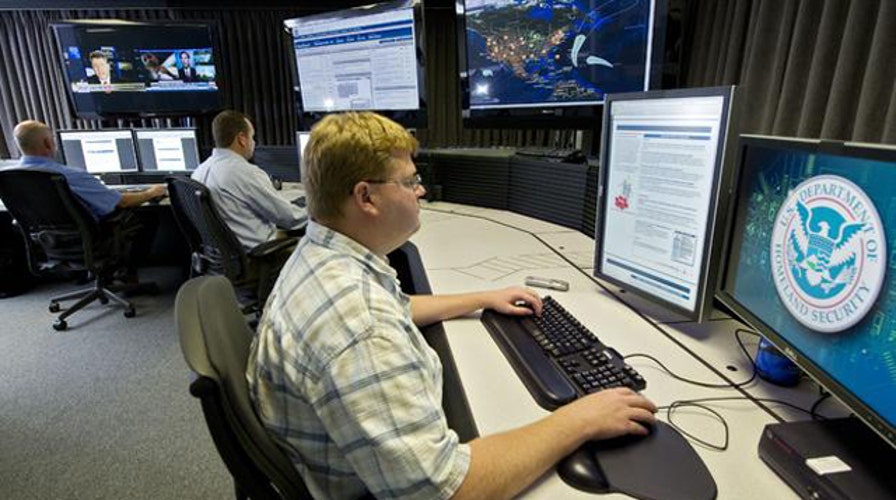How CENTCOM was hacked: What other info is vulnerable?
What did ISIS and its sympathizers have access to and what other sites could be prone to attack?
This is a rush transcript from "On the Record," January 12, 2015. This copy may not be in its final form and may be updated.
GRETA VAN SUSTEREN, FOX NEWS HOST: Just yesterday, a frightening warning from General Martin Dempsey. He warned that if terrorists wage a cyber war in America, we don't have the upper hand.
(BEGIN VIDEO CLIP)
MARTIN DEMPSEY, CHAIRMAN, JOINT CHIEFS OF STAFF: Cyber can be incredibly destructive. It can be disruptive. It can disrupt. And it can destroy. And it can destroy hardware. It can disable critical infrastructure, which could lead to loss of life. And I think those capabilities are out there. And, you know, we have, in every domain, Chris, we generally enjoy a significant military advantage. But we have peer competitors in cyber.
CHRIS WALLACE, FOX NEWS HOST: In other words, we don't have an advantage over that?
DEMPSEY: We don't have an advantage. It's a level playing field. That makes this chairman uncomfortable.
(END VIDEO CLIP)
VAN SUSTEREN: So why are we not ready? How devastating could this be? And is this just beginning?
Tech expert, David Kennedy, joins us.
David, should -- is this the tip of the iceberg? Is this a warning or no big deal?
DAVID KENNEDY, TECH EXPERT: I think it's the tip of the iceberg, Greta. And it's not really a think. We have been warning about this for a number of years in the security industry. You had some big players, like Russia and China, where they have hacked into us for more military preparedness. Terror groups are campaigning for folks that have good expertise when it comes to security and hacking, and are starting to go after big targets. This is just really starting to come to fruition. You are going to start to see a lot of these terrorist groups have a lot more capabilities than what you are seeing today and it could be disastrous.
VAN SUSTEREN: Why though something like Twitter and YouTube? That seems rather tame. That's annoying. Why not jump for the nuclear cyberspace bomb and do something more potent if these terrorists really want to do something?
KENNEDY: We actually had the director of the NSA come out and say our power grid has been hacked and infiltrated a number of times and that they've already entrenched themselves. It's a matter of time when these types of these things happen, it's just a matter of who is actually in there. If you look at the demographics of hacking, China and Russia probably have a large hook into our infrastructure at this point in time. They are not actively going about it because it has disruptions in their own economy. When it comes to terrorists, they're just getting these capabilities up and running. So the Twitter and YouTube attacks, while possibly not sophisticated, is a huge marketing campaign for folks, and especially the younger generation, who has hacking capabilities that may become radicalized or maybe on the jihadist web sites looking at things, to help these types of initiatives to start to focus on this. It doesn't take a large group to do this. You can have a group of 10 folks take down large portions of our infrastructure and grid. That's how bad our security is today.
VAN SUSTEREN: What was actually hacked here? Was it the military accounts or YouTube server and the Twitter server so it wasn't really the military that was hacked? Who was hacked?
KENNEDY: What it looks like is that the attackers were able to gain credentials to the Twitter account. It was probably the same account shared from CENTCOM to their YouTube site. Either they got that through fishing or they easily guess the password. What we typically find is these types of social media sites are handled by marketing type folks within organizations that don't necessarily have huge security passwords. What can I say about that is Twitter and YouTube have capabilities built into them, what's called Two Factor Authentication, that would have prevented this in the first place. But it's a huge marketing campaign for ISIS right now and they are looking like they can hack CENTCOM right now.
VAN SUSTEREN: Will it be easy to identify who did this?
KENNEDY: That's the scary part. It's no longer a military war anymore. It's not like we are fighting and we know who our enemy is, I can disguise myself and make myself coming from North Korea, make myself come from China, make myself come from any demographic that I want to, to make it look like somebody else, or I can bounce myself around to 10 different Internet cafes until somebody thinks I'm at a certain location and I'm really in some other place else around the world. We're at a point now where technology is at such a different type of state where I can be anybody on the Internet and you are not going to be able to find me.
VAN SUSTEREN: David, thank you.
KENNEDY: Thanks, Greta. Good to see you.
VAN SUSTEREN: Good to see you.

